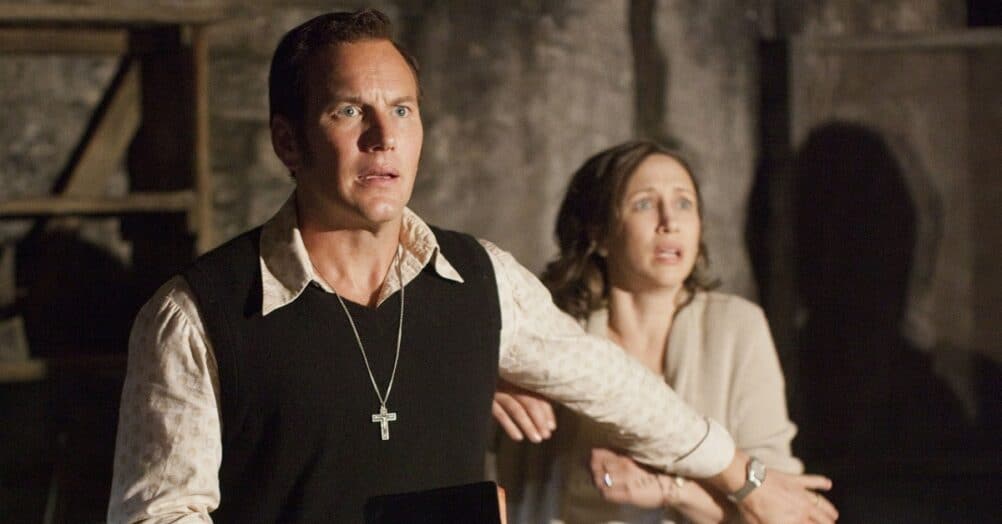Last Updated on August 29, 2024
This week we’re taking a look back at the 2001 psychological-slash-religious horror-thriller Frailty, starring and directed by Bill Paxton.
THE STORY: Frailty is primarily set in 1979 and centers on the Meiks family, a father and his two young sons. The mother died while giving birth to the younger son, but nine years down the line the Meiks guys are living a happy life together. Until one night when the father – who is played by Paxton and credited only as Dad – tells his sons he has seen a vision from God. An angel has visited him and informed him that the devil has set loose demons into the world, and he has been tasked with destroying these demons. Problem is, these “demons” look just like normal, horrified people when Dad gets ahold of them, and the so-called magical weapons he’s meant to destroy them with are just items found lying around: a piece of pipe, a pair of gloves, an axe with the name Otis carved into the handle. Dad says he can see the evil deeds these demons have committed when he puts his bare hands on them, and younger son Adam says he can see these things, too. Older son Fenton doesn’t see any of this stuff. He believes his father has gone insane and brainwashed his brother into being complicit in these murders.
THE PLAYERS: Paxton surrounded himself with a great supporting cast, headed up by Matthew McConaughey, who plays an older Fenton in scenes set in the present day. McConaughey also serves as the film’s narrator as he tells the story to an FBI agent played by Powers Boothe. Matthew O’Leary plays 12-year-old Fenton Meiks, with Jeremy Sumpter as his brother Adam at age 9. Also in the cast are Missy Crider; Luke Askew, who is best known for his early roles in Cool Hand Luke and Easy Rider; and acting coach Vincent Chase, who helped Paxton work with the child actors. If the name sounds familiar to you, that’s because Vincent Chase is the person the lead character in the show Entourage may or may not have been named after. Either way, he wasn’t happy about the show using his name.
THE HISTORY: Screenwriter Brent Hanley has jokingly said that Frailty is 100% autobiographical, as the story is set in a small town in his home state of Texas, where he grew up attending church and reading Stephen King novels. The script was sent out on a Tuesday and quickly rejected by all the major studios, but by Thursday it was in the hands of Child’s Play producer David Kirschner, who optioned it and began working with Hanley on further drafts.
The script was eventually sent to Hanley’s fellow Texas native Paxton, but getting him to direct the film wasn’t the original intention. While Kirschner was only hoping he would sign on to star in it, Paxton got so wrapped up in the material that he pitched the idea of him getting behind the camera as well. This became Paxton’s feature directorial debut, and his second directing credit after that wacky “Fish Heads” video he made in 1980.
Taking inspiration from classic child-in-peril films like The Night of the Hunter and Invaders from Mars, Paxton wanted his movie to have an old school look and feel, and he recruited Jaws cinematographer Bill Butler to help him with that. The fact that the story was set in Texas was something else that had appealed to Paxton from the start, and even though the movie would end up being shot in California for budgetary reasons, he strived to make it seem as Texas as possible. Part of that endeavor was the casting of Boothe and McConaughey, both Texans, and Paxton said the film got funded and distributed because of McConaughey. “Once we decided to appear in the picture together, that’s really when Lions Gate waded in. Then I got carte blanche after that – great creative freedom. Matthew I owe a great debt to, because without his participation the film wouldn’t have been made.”
Produced on a budget of 11 million dollars, the film ended up pulling in just 17 million at the global box office when it was released on April 12th, 2002, getting lost in the shuffle among other releases like Resident Evil, Blade II, Panic Room, and The Scorpion King. Even Changing Lanes, The Sweetest Thing, and Murder by Numbers bested it at the box office – and when you take into account that box office juggernaut Jason X came out just two weeks later, it’s plain to see that this movie never stood a chance. Just kidding about that one, Jason X made even less money than Frailty did.
There were too many other, flashier options in theatres at the time, and the abstract title surely didn’t do it any favors. The suggested alternative title “God’s Hands” probably wouldn’t have fared any better. But really, this isn’t a movie that was likely to be raking in the dough no matter when it was released. This sort of heavy subject matter, with no fantastical elements other than a quick shot of one of Dad’s angelic visions, isn’t something that was going to have average moviegoers flocking to it. After viewers at early screenings were offended by the perceived child abuse, called the film morally disreputable, and even walked out in droves when the first killing happened, Paxton was feeling like he and his movie might be in trouble, so he turned to some familiar names for help. He showed the movie to his collaborators James Cameron and Sam Raimi, as well as Stephen King, hoping they would give him positive quotes to feature in the marketing. And they did. Frailty was promoted with quotes from each one of them. Those quotes weren’t much help to the movie financially, but at least they helped save the film and Paxton from getting a bad reputation.
Then again, maybe it would have made more money with some controversy. Maybe they should have featured quotes in the marketing like “Is Bill Paxton really an insane religious fanatic?” and “Does this movie promote murder and child abuse? Come see and decide for yourself!” Of course, Paxton wasn’t advocating that parents force their children to kill people with them for religious reasons, he was telling a horror story, and the fact that those people in early screenings were so outraged and disturbed really goes to show how engaging and effective his storytelling was.
Frailty was reasonably well received by those who did see it when it was first released, with Roger Ebert, who was known to have something of a shaky relationship with the horror genre, even giving it a 4 star review. It just wasn’t seen by many people.
WHY IT’S GREAT / BEST SCENES: It was a lucky break for everyone involved that Paxton decided to bring his vision of the story to the screen, as the film holds up to this day because of the classic approach he took to the material. He said he decided to direct the film because “I was worried that a wild-eyed director would get hold of this material and sensationalize it just to shock people. And that, to me, wouldn’t do the script justice. My vision of this story has always been the idea that it is a very edgy script that pushes a lot of buttons, especially because children are involved. But I thought that’s exactly the reason to give it a real, old Hollywood approach, where all of the darkness is implied instead of being explicit. We hear a chop or a scream, but we never see a drop of blood.”
In the hands of a different director, this easily could have been something gore-soaked and appalling, shocking in the moment but forgettable. Paxton turned Hanley’s script into one of the most engrossing and well-crafted horror films of the last twenty years.
The story needed to be handled delicately, because the concept is deeply disturbing right away. The Dad character is attentive, obviously cares for his sons Fenton and Adam, jokes around with them, and makes sure they know he loves them. Then he’s telling these young kids that he needs their help killing these demons that appear to be human beings, and it’s terrifying no matter what the reality is. If Dad is right, there are demons just walking around out there. If Fenton is right, if Dad is crazy and the kids are stuck with him while he murders people in front of them and says he’s doing something righteous… well, that’s even scarier than the idea of demons. For most of the film we’re seeing things play out through Fenton’s eyes, so we’re skeptical of Dad’s claims from the start. It’s like we’re watching an act of child abuse being carried out by a beloved parent who has gone crazy and become a serial killer, as Dad murders people and dumps their corpses in the public rose garden next to the Meiks family home.
The cast made all of this thoroughly believable; Paxton is reliably great in the role of Dad, and O’Leary proved to be capable of carrying a large amount of the film on his shoulders. The cutaways to McConaughey and Boothe add an extra sinister edge to the proceedings, and Sumpter did well as the younger and more naïve of the Meiks brothers.
One of the best things about Paxton’s performance is that, even as the Meiks family home life turns into a living nightmare, Dad never loses his loving, caring demeanor. A great example of this comes when Dad is trying to convince Fenton to help him capture the latest demon-person. Fenton says he can’t, and Dad replies, “Can’t never could do anything.” It’s such a goofy dad thing to say when their kid tells them they can’t do something, but here it’s said in the middle of a very dark and twisted situation.
The film benefits from not being overly stylized; the more down-to-earth and natural it looks, the more realistic it feels, and that makes the horrific events all the more unsettling. Paxton and Butler were quite successful at capturing that old school look they were going for, complete with driving scenes shot on a sound stage and a floating head gag that was accomplished by having the actor wear black clothing in a dark room and looks like something straight out of the 1950s.
That floating head shot is part of one of the film’s standout sequences, in which Dad locks the defiant Fenton in a cellar, telling him he’s to stay in there and pray until God shows him a vision of the truth. Fenton is down there for days, and McConaughey’s voiceover tells us that he goes “beyond fear into total insanity”. It’s really great, troubling stuff.
All this time after its initial release, Frailty is still just as gripping as it was when it first came out. Hanley’s script has so many layers to it, and Paxton and his supporting cast brought the story and characters to the screen in such a pitch perfect way, this a movie that not only holds up to multiple viewings, it begs to be seen multiple times. Paxton was quoted as saying, “If you’ve only seen the film once, you’ve only kind of seen half the film.” Unfortunately, it still seems that not nearly enough people have seen the movie at all, because it doesn’t get referenced very often.
SEE IT: For anyone who would like to watch the movie now, it’s readily available on Blu-ray and DVD, even in some multi-film packs with other Lions Gate releases. It can also be rented or purchased through Amazon Prime Video.
PARTING SHOT: Bill Paxton wasn’t just one of our great character actors, he also proved to be a fantastic filmmaker. It’s a shame he didn’t get the chance to demonstrate his skills in that department more often, but at least he was able to give us Frailty. If you haven’t seen this movie yet, seek it out… and watch it a couple of times.




















Follow the JOBLO MOVIE NETWORK
Follow us on YOUTUBE
Follow ARROW IN THE HEAD
Follow AITH on YOUTUBE